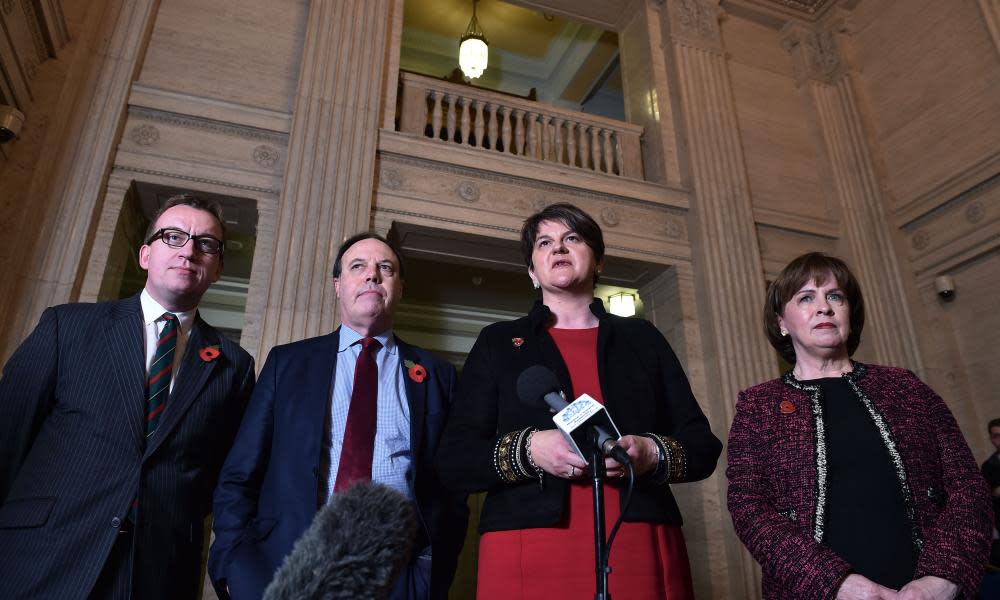The DUP’s overreaching on Brexit could lead to a united Ireland

Each time I visit Dublin or Belfast, people immediately want to know about the state of play on Brexit. Can the Conservative party truly be as incompetent and divided as it seems to be? Or could the apparent chaos be a machiavellian ploy, with a diabolically clever plan to be unveiled in the final scene? Now the cabinet has been summoned to an emergency meeting tomorrow, we may be about to find out.
The Democratic Unionist party will scrutinise the withdrawal agreement with a gimlet eye for any evidence that Theresa May has reneged on her commitments to it by granting a backstop agreement that could give Northern Ireland a special status within the UK. But the DUP leader, Arlene Foster, should be careful not to overplay her hand. May’s political bedfellows have wasted no time in throwing their weight around and talking up their role in the confidence and supply agreement, signed after the Conservatives lost their majority in the 2017 election. At any point, they claim, they can sink the government by withdrawing the support of their 10 MPs. But the question of whether May will renege on her commitments to them over the status of Northern Ireland is only one problem faced by Foster’s party. Within the DUP a power struggle is looming.
The question of whether May will renege on her commitments to the DUP is only one problem faced by Arlene Foster’s party
Rumours have circulated for months that the DUP is preparing the same fate for Foster (who is not an MP) as the one possibly awaiting May after Brexit finally happens. For years the party’s Westminster MPs have vetoed and slapped down Foster’s suggestions as party leader, and they have far greater control of the direction of the party. Both inside and outside the DUP there is the sense that Foster could well be pushed aside after taking her share of the blame for a messy Brexit. Some MPs were making themselves very visible at the Conservative party conference this year, boosting their public image for a potential leadership bid.
The biggest problem for the DUP is closer to home. The business community is exasperated by the party’s refusal to entertain the prospect of a backstop for the north, preserving the frictionless border with the south. Chief executives, lobbyists and large company owners have spent time flying to London and Brussels, explaining how reliant their businesses are on frictionless trade not just with the Republic of Ireland but with the European market as a whole. Already, businesses are struggling to recruit staff because of the pound’s weakness. One company preparing turkeys for Christmas has resorted to bussing people from Dungannon to Coleraine (over an hour away), purely in an attempt to process enough meat to furnish seasonal family tables.
A hard border would also be an open door to criminal gangs, argue business owners in the food and agriculture sectors; talk of it emboldening paramilitary groups and dissident republicans pales in comparison with the money-making opportunities other gangs will spy. As one senior businessman pointed out to me, smuggling is already a huge issue, but “when people realise they can make more smuggling garlic bulbs than cocaine, you’ll do it – who is likely to put you away for that?”
The majority of people in Northern Ireland voted against Brexit, and will be affected far more directly than the rest of the UK population, but their views have been almost entirely ignored by unionists pushing for the hardest of Brexits and kicking back against the prospect of any regulatory divergence for the north, (although the party is happy to diverge by blocking gay marriage and abortion).
In truth, unionism has become increasingly unmoored from day-to-day life. All the business people I spoke to, north and south of the border, had come to the same conclusion: reality had to take over at some point. “We’re talking livelihoods and jobs, lost for ever,” said one unionist business owner who voted leave. “There’s no way I can vote to do that. I’ll tell friends one on one, but publicly pretend I haven’t changed my mind.”
While the DUP won’t budge, its voting base is weighing up the political realities and finding that, in the context of a hard or no-deal Brexit, the union offers far less than does a united Ireland. Increasingly, dyed-in-the-wool unionists are admitting a no-deal or hard Brexit would see them abandon the project. A recent poll found 62% of people believe a united Ireland is more possible because of Brexit. Foster might demand May and the Conservatives move to accommodate her, but the growing grumblings of unionists increasingly suggest the DUP has overreached itself this time.
• Dawn Foster is a Guardian columnist

 Yahoo News
Yahoo News 
